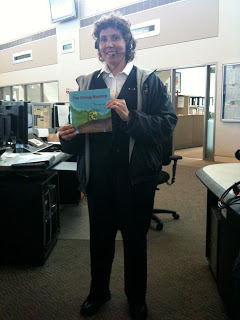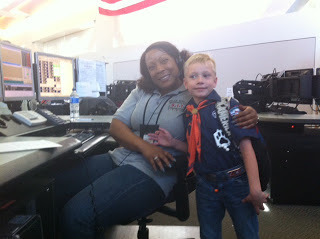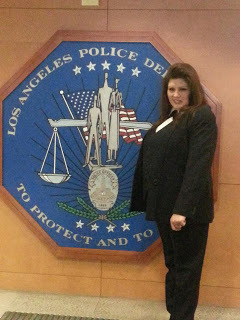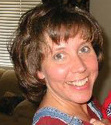Celebrate National Dispatcher Week this week: 14-20 APR 2013
 Me at work, holding my children's book
Me at work, holding my children's bookIt's National Dispatcher's Week. Hug a dispatcher if you have a chance. JAll right, the unknown voice on the line wouldn't mind a letter or a simple "thank you," either.
I'm a 911 dispatcher for LAPD and it's a job I find personally rewarding. Being a 911 dispatcher, I know I'm the first 1stresponder to the problem. I've got to get the information quickly and accurately to send the help you need. Sometime it's not so easy.
In 1991, President George H.W. Bush signed the first bill declaring the 2nd week in April "National Telecommunicators (dispatcher) week. This week in LA we're opening up the doors at our downtown dispatch center and inviting the public in to learn what it's like to be a dispatcher.
911 is intended for emergencies, specifically for police, fire, and paramedic dispatch. It's not for a caller to ask for the time, pranks (we get these a lot from pay phones at high schools when they let out for the day) weather checks, ordering a pizza, complaining about heavy traffic, or even complaining about your hamburger not being cooked the way you like it. Trust me, I've heard all of these and then some. My favorite? Answering the phone with: "911 Emergency, Operator 806" and the next thing I hear is a flushing toilet.
So how did 911 come about?
In the US, about 42 years ago, but the concept has been around much longer than that and there's no simple answer. In the UK, they started using "999" as a National Emergency number in 1937. Canada began using an emergency number in 1959. It started off as "999" but switched to "911" when the US went to "911."
 My son, Joe, at the dispatcher center w/Dana In the US, prior to the 1950's, one had to dial an operator to place a call so if you had an emergency, the operator would patch you through. Then rotary phones with dial tone were introduced. In 1957, a presidential commission recommended creating a single emergency number. The FCC worked with AT&T and 911 was born. On Feb 16, 1968, the first 911 call was made.
My son, Joe, at the dispatcher center w/Dana In the US, prior to the 1950's, one had to dial an operator to place a call so if you had an emergency, the operator would patch you through. Then rotary phones with dial tone were introduced. In 1957, a presidential commission recommended creating a single emergency number. The FCC worked with AT&T and 911 was born. On Feb 16, 1968, the first 911 call was made.Question: Who answers a 911 call?
Answer: Dispatchers work at a Public Safety Answering Point (known as a PSAP). Once we identify the problem, we direct the call to the appropriate resource: police, fire or paramedics.
Question: When I call 911, do you get my location?
Answer: Most of the time, but that's not an easy question to answer. Consider this:
If you're calling from a landline phone, 99% of the time, the dispatcher will your location accurately. This comes from a "trunk" line established between your phone company and the PSAP.
However if you have VOIP (Voice Over Internet Protocol) you could be calling in Scotland and get LAPD 911. How is that possible? The connection with the PSAP isn't being made with a trunk line, but a broadband Internet line, and that line can originate ANYWHERE. The Internet doesn't dedicate lines to go to your local PSAP.
Now, say you have a CELL PHONE – when you call on a cell phone I get either the nearest cell phone tower the cell phone is using, or a location within 500 meters of the phone. I don't get your actual location.
That's why it's so important for me as a 911 dispatcher to get the location of the emergency VERBALLY from the caller.
Question: Can I send a text to 911?
Answer: Right now, no, but currently, that is something the phone companies are working on and it might be possible in the future.
Question: Can I call 911 from a disconnected phone?
 Julia Cesena, Supervisor of the Year, CPRA 2013Answer: Yes. In the US and Canada a disconnected phone will dial 911. (But it won't give location information) (As long as that phone has power, it will call 911 only, no power, no call)
Julia Cesena, Supervisor of the Year, CPRA 2013Answer: Yes. In the US and Canada a disconnected phone will dial 911. (But it won't give location information) (As long as that phone has power, it will call 911 only, no power, no call) Question: How is 911 funded?
Answer: Depending on your location, cities and counties may charge a fee in addition to federal fees. These fees vary and are listed on your phone bill you get from the phone company. My fee for my landline bill is $10.00 a month. Cell phone companies also charge a fee.
Question: When I call 911 what do I say?
Answer: Be prepared to give your location, your phone number, and tell the operator in a COHERENT fashion what the problem is. It is hard to determine what help to send if you keep crying.
I've been a dispatcher for LAPD now for 13 years. It's a job I enjoy. I don't take it home with me, and I get a lot of personal satisfaction knowing that I was able to help people who genuinely needed help. Rarely do I hear "good job," "atta-girl," or receive recognization for staying on the phone with the caller during a harrowing situation. The police and fire officers who respond usually get the "atta-boys" and they deserve to, but this week, if you have a chance let the first 1st Responder, the unsung hero who answered your call know you appreciate them.
Have a coffee and a nip of chocolate for me.
Author Bio: Stephanie Burkhart is a 911 dispatcher for LAPD. She writes paranormal, contemporary, and steampunk romance as well as children's books. She's addicted to coffee and adores a good piece of chocolate. She's also a boy scouting mom and owns a golden name Amelia.
Published on April 15, 2013 09:53
No comments have been added yet.



